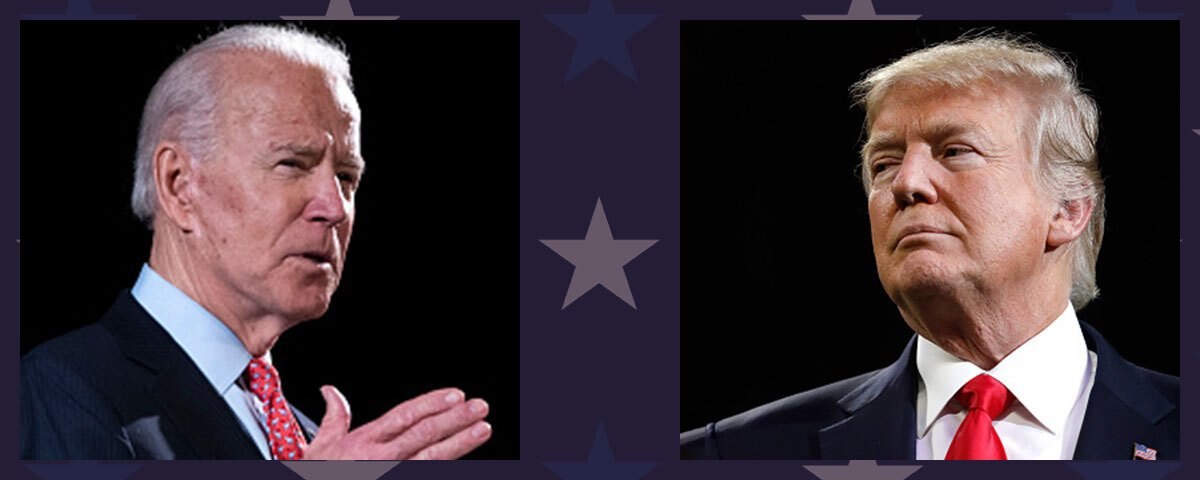As the presidential race takes off in earnest with two months until Election Day, the latest Economist/YouGov Poll finds the shape of the election much as it was before the Republican and Democratic National Conventions. The Democratic nominee, former Vice President Joe Biden, leads President Donald Trump by about the same margin he did before the unconventional conventions. Half (51%) of registered voters now say they will vote for Biden, two in five (40%) will vote to re-elect the president, statistically unchanged from the 50%-40% Biden margin before the conventions.
Does that mean the conventions didn’t matter? Not at all. They provided a mechanism for both candidates to attack each other and attempt to change the opponent’s image. The parties did the former, but not necessarily the latter. In the wake of the police shooting of Jacob Blake in Kenosha, Wisconsin and continued protests about earlier killings of Black Americans by police officers, the GOP and President Trump ran a convention about law and order.
That focus — and the nature of these protests and counter-protests — may have changed opinion. The national response in this week’s poll to the demonstrations has been markedly different from the response to the protests earlier this summer. In early July, Americans saw the protests as mostly peaceful (though Republicans disagreed). Now, the nation is divided on the general behavior of the protesters. Independents have shifted, as have white Americans.
There is also a division when it comes to overall approval of the demonstrations. The country is also split on whether to approve of the protests: 45 percent approves of them and 43 percent do not. Republicans disapprove by nearly three to one.
Why doesn’t this change the presidential race? This election is still about Donald Trump, not truly a contest between two individuals, and not entirely about race and policing. Three in five (61%) Biden voters say they are casting their ballot mostly against the President; four in five (81%) supporters of the president’s are casting a ballot for their candidate. While more Trump voters than Biden voters are very enthusiastic about voting for their candidate, voting against someone also can be a motivation. Nine in ten Biden supporters – and nine in ten Trump voters – believe it is very important for them to vote this November.
But the president’s overall image didn’t change much after his convention. More than half of registered voters still hold an unfavorable view of President Trump; opinion of Biden continues to be evenly divided. Did the Republican Convention succeed in casting Biden as a radical extremist? Mostly no. While more than a third of voters (38%) believe Biden holds extreme political views, that’s far less than the majority (56%) who believe the president holds extremist opinions. One in four of those now supporting Donald Trump believe he has extremist opinions.
Many voters aren’t really sure what the two candidates’ opinions are (one in five voters say they are not at all sure about what Biden would do is elected, and even more (30%) admit they have little idea what the President would do. That may be because many voters think the candidates aren’t telling voters their plans but are just attacking each other.
Most voters (56%) believe President Trump spends more time attacking his opponent rather than explaining what he would do with a second term (34%). In contrast, Biden is seen as a candidate who is slightly more likely to spend time explaining what he will do if elected president (45%) than attacking the his opponent (41%).
As far as handling crime, neither candidate fares especially well: most (55%) are uneasy about the president’s approach to handling crime; 44 percent are uncomfortable about Biden’s approach.
The national conventions are mostly partisan affairs, with viewers mostly comprised of those voters already committed to a candidate. Trump voters were three times as likely as Biden voters to watch at least some of the 2020 Republican Convention; Biden voters were more than twice as likely as Trump voters to have watched the Democratic Convention.
The presidential debates, which start this month, will likely attract a much broader audience than the conventions. These unscripted events do give the two candidates to reach out to their supporters, discourage their opponents, and lure in the tiny fraction of registered voters (4% in this poll) who say they are undecided about their choice, and the 2 percent who claim they will not vote at all.
See the toplines and crosstabs from this week’s Economist/YouGov Poll
Methodology: The Economist survey was conducted by YouGov using a nationally representative sample of 1,500 U.S. adult citizens interviewed online between August 30 - September 1, 2020. This sample was weighted according to gender, age, race, and education based on the American Community Survey, conducted by the US Bureau of the Census, as well as 2016 Presidential vote, registration status, geographic region, and news interest. Respondents were selected from YouGov’s opt-in panel to be representative of all US citizens. The margin of error is approximately 3.5% for the overall sample.
Image: Getty









